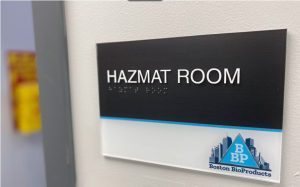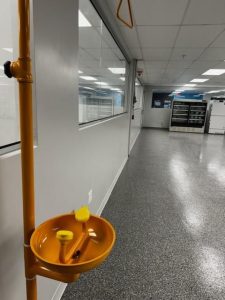Biotech, pharmaceutical manufacturing, scientific research and similar industries rely on cleanroom technology for life science innovation. Therefore, the integrity of a cleanroom floor system shouldn’t be overlooked, but rather a consideration in the overall design of a space.
Advanced solutions for cleanroom flooring should be engineered to the individual spaces to mitigate the element of contamination. When you dive into the advantages of seamless floor solutions, and their critical role it plays in maintaining stringent conditions of cleanrooms, resinous floors stand out among the rest. From increased resistance to chemicals and static charges to a significant reduction in contamination risks, the having right flooring is pivotal.
Industry Standards for Cleanroom Flooring

Achieving the rigorous industry standards set for cleanroom flooring is essential for ensuring an environment that minimizes the risk of contamination. Cleanroom floors must comply with a variety of protocols, including international standards that classify rooms based on the permissible amount of particulate matter in the air. These standards often lead to the choice of seamless flooring, which is paramount to preventing the growth of bacteria and accumulation of dirt in hard-to-reach places.
The materials used for such flooring should be easy to clean, moisture-resistant, non-porous, and have chemical resistance properties. Non-slip surfaces are also a necessity, as they maintain a safe working environment for personnel. The ideal cleanroom floor will maintain its integrity and appearance even after frequent sanitization, contributing to the overall sterility required in these controlled environments.
What Are the Benefits of Seamless Flooring in Cleanroom Environments?
Seamless flooring is the cornerstone of any biotech lab or pharmaceutical cleanroom environment, offering a high degree of functionality and sanitization advantages. A smooth, seamless surface without cracks or crevices removes the risk of dirt and bacteria accumulating and contaminating the space. This is critical to maintaining a pristine area of research and production. The right floor will also bolster safety with non-slip surfaces that could otherwise be slick hazards for employees.
Seamless flooring, often composed of materials like epoxy and urethane, are inherently moisture-resistant and non-porous. This characteristic is significant in cleanrooms where spills are a possibility, as it allows for quick and effective clean-ups, safeguarding the surface integrity. Rapid decontamination is vital to sustaining sterile conditions.
The durability of seamless flooring stands up to heavy traffic, enduring the constant movement of personnel and equipment without compromising its seamless nature. By eliminating spaces where contaminants could hide, seamless floors play a pivotal role in upholding the strict hygiene standards required in cleanroom settings. Here are a sample of the many benefits of seamless flooring for cleanroom environments.
Increased Chemical Resistance
Cleanroom floors face numerous challenges, including chemical and acidic spills. High-performance epoxy flooring offers a high degree of resistance to a multitude of chemicals. Black Bear’s flooring solutions help pharmaceutical and laboratory cleanrooms withstand exposure to harsh and volatile elements without degrading the floor.
The aesthetic value of this high-performance flooring is not overlooked either. The availability of quartz-colored top layers satisfies the visual and functional criteria, offering both chemical resistance and a textured surface for added safety. Such solutions underscore the importance of an industrial floor system that not only meets the industry standards for performance but also contributes to the overall atmosphere of the facility.
Prevention of Electrostatic Discharges
Electrostatic discharges (ESD) present a significant hazard in cleanrooms. Black Bear engineers flooring systems to include ESD properties that protect sensitive equipment and processes by efficiently dissipating static electricity. The inherent conductivity of such floors ensures full-spectrum dissipation across the surface, thereby circumventing the need for frequent recoating.
The implementation of ESD flooring is especially critical in areas like operating rooms or in the manufacturing of electronic components, where static electricity can lead to equipment malfunctions or cause physical harm. Appropriate formulation prior to application can offer a durable ESD flooring for cleanroom operations.
Reducing Microbial Contamination Risks

Fostering a contaminant-free cleanroom environment requires the choice of flooring to be a primary consideration in the design phase. Black Bear’s cleanroom flooring solutions are designed with anti-microbial properties, creating a hostile environment for microorganisms and thus reducing the risk of contamination. The seamless, non-porous nature of the flooring options available plays a fundamental role in keeping areas hygienic, as it facilitates thorough cleaning and sanitization.
Specialized materials like epoxy and urethane are well known for hardiness against corrosive substances that can increase microbial contamination. Such materials are ideally suited to strict cleanroom environments found in the pharmaceutical and biotech industries. By mitigating the danger of contamination from chemical spills and other sources, seamless, moisture-resistant flooring ensures the utmost in safety and sterility within cleanroom settings.
Prevention of Contamination by Aerosol Particles
Believe it or not, flooring plays a role in the prevention of contamination by aerosol particles within a cleanroom setting. Seamless flooring presents an environmentally considerate and cost-effective alternative that not only lasts for years but also reduces the cleanroom’s carbon footprint. To effectively prevent the accumulation and spread of particulates, a cleanroom’s flooring must be seamless, free from wax, and designed for complete particulate removal. Given that the majority of contamination typically originates from the floor, the selection of an effective flooring solution is key to maintaining the integrity of cleanroom operations.
Compliant Floors
Biotech and the life science sector are heavily regulated industries. Critical assessments such as elevated temperature out-gassing tests are performed to assess the safety of the environment and often help to compare the different protective elements of cleanroom flooring. Results from these tests show that epoxy typically offers superior performance compared to vinyl, as it does not contain plasticizers that can compromise cleanliness levels. Considering the seamless application of epoxy coatings, they are often favored for their uniform finish and reduction of particle traps.
Ease of Cleaning and Maintenance
As mentioned before, seamless flooring is a favorite choice for its ability to prevent the harboring of contaminants and microbes in any seams or cracks, offering a robust defense against microbial contamination. These floors can also withstand intense heat and rigorous sanitization processes needed to maintain the integrity of the space. Regular maintenance will ensure the longevity of the industrial floor without the need for renovation or repair as opposed to vinyl and rubber flooring. By giving due consideration to these factors, facility managers can ensure that the flooring they choose will not only meet the stringent requirements of a clean room environment but also enhance its overall functionality.
Meeting the Requirements of Facility Managers

For facility managers, meeting the stringent requirements of cleanroom flooring goes beyond mere aesthetics. Material selection plays a crucial role, with ESD vinyl often failing in outgassing tests due to plasticizer content, whereas ESD rubber and epoxy fare better under such scrutiny. The popular choice of epoxy coatings for their seamless and durable finish must be weighed against their propensity to generate static charges and issues with repairs. Nonetheless, the low porosity and resilience under heavy traffic make epoxy flooring a practical solution for many cleanrooms. It provides a wide gamut of colors and performance options, allowing for customization to suit various facility requirements. Urethane flooring is another choice praised for its chemical resistance, proving adept for places where spills and exposure to harsh substances are a primary concern. Lastly, VCT presents a cost-effective option for cleanrooms, providing electrostatic dissipative properties, although its many seams demand more attention in terms of maintenance. Facility managers must carefully weigh these options to select flooring that aligns with the specific needs of their cleanroom operations, whether that is to withstand chemical exposure, provide easy maintenance, or offer a lasting static control solution.
Resinous Floors for Cleanrooms
When selecting the optimal cleanroom flooring, resinous coatings have emerged as the preferred industrial floor of choice. Epoxy coatings, known for high performance, is regarded as the best option for cleanrooms that demand exceptional abrasion, wear, and chemical resistance. As a seamless solution, it’s ideal for cleanrooms that need a hygienic and easily cleanable surface.
Epoxy floors are synonymous with superior performance. These floors offer outstanding abrasion and chemical resistance, making them a favored option for high-demand environments. Epoxy quartz mortar enables a decorative yet practical slip-resistant surface, enhancing safety. These floors are dense, seamless, and with low porosity—a trifecta that makes them a breeze to clean.
Contact Black Bear Coatings & Concrete for Pro-Grade Cleanroom Flooring Solutions
When it comes to seamless, resinous floors for cleanroom environments, precision in every aspect of design is crucial. Black Bear Coatings & Concrete has paved the way for excellence in engineered cleanroom flooring and installation. Our niche expertise team means we understand what goes into successfully installing high-performance commercial and industrial floors systems in cleanrooms and labs. These installations adhere to the rigorous standards that demand safe, sterile, and hygienic conditions.
Ideal for sectors such as biotech, pharmaceutical, or laboratory clean rooms, Black Bear’s flooring solutions exceed industry standards, assuring facility managers a durable and compliant solution for reducing the risk of contamination. Learn more and request an on-site assessment.
Talk to Black Bear about designing and installing a beautiful, durable surface for your pharmaceutical facility. Fill out the online form and a client representative will be in touch. Or, please call 978-405-0017.
To learn more about industrial flooring for the pharmaceutical industry, check out our guide to choosing the right flooring for life sciences.
Specialized Solutions for:
Industry Compliant
Installed with Little Downtime
High Performance
Sanitary and Easy to Maintain
Skid, Slip & Chemical Resistant